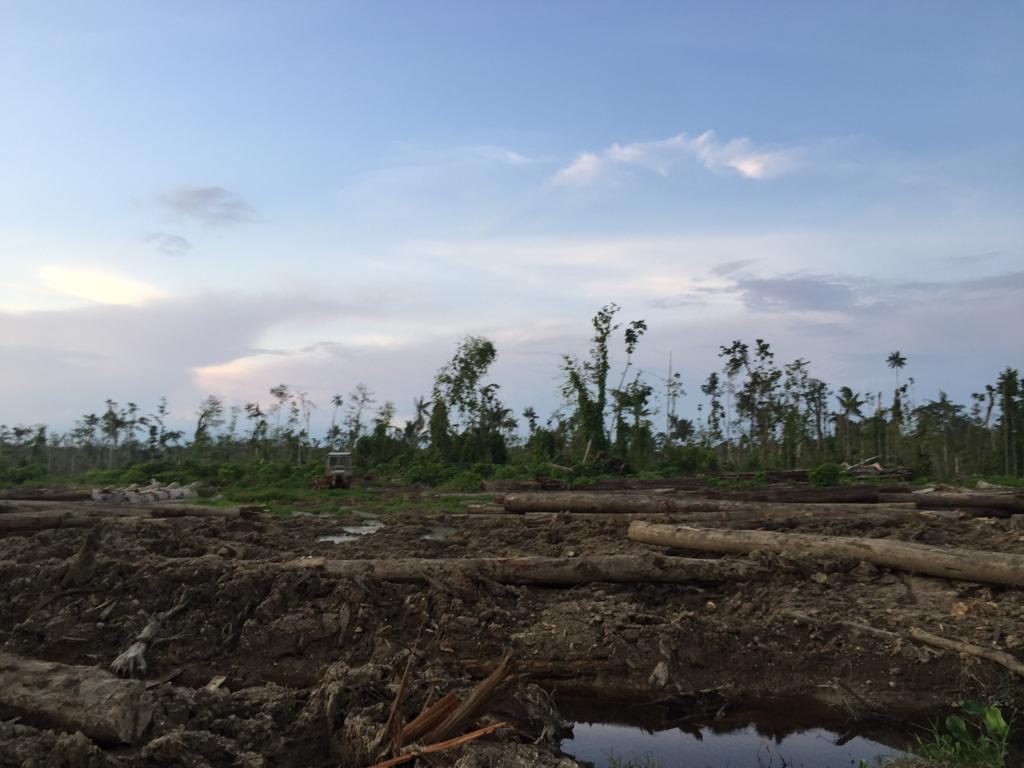 There are indications that PT Subur Karunia Raya (PT SKR) decieved customary landowners of the Yerkohok clan, through an agreement it signed with Donatus Yerkohok, an elder of the Yerkohok clan, in Jagiro Village, Moscona Selatan sub-district, in Bintuni Bay Regency.
There are indications that PT Subur Karunia Raya (PT SKR) decieved customary landowners of the Yerkohok clan, through an agreement it signed with Donatus Yerkohok, an elder of the Yerkohok clan, in Jagiro Village, Moscona Selatan sub-district, in Bintuni Bay Regency.
According to Donatus, he was paid ‘knock-on-the-door’ money amounting to 195 million Rupiah for 1649 hectares of lannd. The company gave this money to two individuals as representatives of the family who hold customary rights in the area, Donatus and Yeremias Yerkohok. Donatus received 175 million for 1227 hectares of land while Yeremius was given 20 million for around 422 ha. If this is calculated per square metre, PT SKR only gave 14 Rupiah per square metre to Donatus, and 4 Rupiah per square metre to Yeremias.
The customary land owners don’t know what was written in the agreement between them and the company. After signing it, they were not given an original copy of the document signed by the company, which is not in accordance with a proper implementation of the principle of Free Prior Informed Consent. “First of all, at that time, the company came with a letter about this may-I-come-in money, we didn’t really know what was in the document. I want to report this so they review the palm oil plantation plan. Secondly, it was only us indigenous folk that signed, no responsible party present like the sub-district government was present, so that’s why we say we were deceived by them. They didn’t give us a copy of the agreement, not even a photo. The company didn’t read out the contents of the agreement to us and I didn’t read it. They said that our signature was just to show they had ‘knocked on the door’, but the way I see it is that it was impossible that we would ever be able to read such a thick document,” Donatus said.
As well as feeling he had been deceived into signing the agreement, Donatus has made a commitment that he will return the money he received, if the company refused to revisit the contents of the agreement. “We are asking the company to review this agreement, if they don’t then I’m out of it, I’ll return the money”
When he was asked about the name of the company which made this agreement with the customary landowners, Donatus said that he didn’t know the name of the company. “I don’t know the name of this company, we only know it’s the same company that started work in Meyado and then in Barma,” Donatus said.
PT SKR is believed to have initiated communication with the elders of the Yerkohok clan in Jagiro village within the last year, but has never presented its plans publicly to the wider community which lives in Jagiro village. The head of South Moskona sub-district Siprianus Yerkohok also confirmed that the company had not tried to engage with the sub-district administration “they arrived and just met straight away with the customary rights holders, they never met with us, the government representatives at the sub-district level”. When asked about the agreement that had been drawn up between the company and the customary rights holders, Siprianus siad that he had no idea what was in the agreement and that he hadn’t been involved in producing the agreement.
The land around Jagiro is land belonging to the ancestors which has been passed on to members of the Yerkohok clan so they can meet their livelihood needs. This land is subject to PT SKR’s plantation business licence even though there are still ingienous people living in the area. Metejimow, the local name for the sago groves which provide people’s staple food are still found in the area, stretching from Keibur village as far as Irahima village. Around Christmas, New Year and for other festivities, members of the clan visit the metejimow to pound the starch found in the sago trunks. Yistus Yerkohok, as an elder of the Yerkohok clan, is committed to not hand the metejimow over to PT SKR. “We need to guard our sago grove, the company may not clear in that area. It’s a historic place, it is where out ancestors used to pound the starch, just as we do today. There are no other sago groves remaining in the area, just that one”.
In the same vein, Mafret Yerkohok as a representative of the youth of Jagiro village also complained about the company’s presence. “I don’t agree with palm oil moving in, as it will have an impact on our children and grandchildren, so we hope all relevant parties can get involved and resolve this problem”.
Source: Perkumpulan Panah Papua Press Release, 28 Mei 2019
